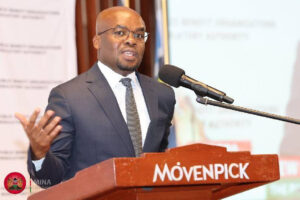
NAIROBI, Kenya Oct 26 – National Assembly Speaker Moses Wetang’ula has defended the Computer Misuse and Cybercrimes (Amendment) Act, 2025, stating that the law aims to protect the sanctity of the family unit, particularly children, while curbing violent extremism, online exploitation, and the spread of cultism in Kenya.
Speaking on during a Sunday church service at St. Teresa’s Isanjiro Catholic Church in Malava Town, Kakamega County, Wetang’ula dismissed claims that the Act is intended to muzzle free speech.
He insisted it is a moral safeguard designed to promote responsible digital behavior in an era of rapid technological transformation.
“he Act is not meant to gag anyone or restrict legitimate expression. It is meant to protect our families, especially our children, from harmful online content, deter violent extremism, and stop the spread of cult-like ideologies that prey on the young and vulnerable,” said Wetang’ula.
The House Speaker noted that while Kenya’s digital transformation has brought immense benefits in commerce, education, and communication, it has also exposed society to new risks such as cyberbullying, child pornography, online radicalization, and misinformation.
“As a lawyer of many years, I can assure you this law is sound. Countries like the United States, France, Australia, and the United Kingdom have enacted similar laws to protect their societies. Kenya cannot be left behind,” he stated.
Speaker Wetang’ula emphasized that the law empowers a dedicated agency to identify, penalize, and take down websites promoting harmful content, including cultism, violent extremism, and pornography.
“We saw what happened in Shakahola, where innocent Kenyans lost their lives after being brainwashed through digital platforms. Such tragedies must never happen again,” he said.
He urged parents to remain vigilant in the face of these emerging challenges.
“When I leave my phone with my children, I want them to see messages that are decent and educational, not pornographic material. As parents and as a nation, we must protect our children because they are still in formative stages,” the House Speaker stated.
Wetang’ula explained that the Computer Misuse and Cybercrimes (Amendment) Act, 2025, strengthens existing mechanisms for detecting, preventing, and prosecuting digital offenses, including cyber harassment, online fraud, and radicalization, while encouraging responsible online behaviour.
“Freedom of expression comes with responsibility. When technology is abused to promote hate, misinformation, or to exploit children, the State must intervene in the interest of public safety and moral order,” he noted.
The Speaker also expressed concern about digital cult movements that lure young people into dangerous ideologies through social media, stating that the government cannot allow Kenya’s online space to be turned into a “recruitment ground for cults or extremist groups.”
“We cannot sit back and watch as digital spaces become breeding grounds for cults and radical groups. This law gives us the tools to protect our youth,” he said.
Wetang’ula urged parents, educators, and religious leaders to actively guide children on safe internet use, adding that technology companies must cooperate with the government to flag and remove harmful content.
“Those who say the law is oppressive are wrong. It is progressive, forward-looking, and ensures that as we enjoy digital freedoms, we also protect citizens from abuse, exploitation, and manipulation,” he said.
He added that Parliament remains open to reviewing the law should genuine concerns arise but emphasized that protecting children and national security will remain non-negotiable.
“This law is a living instrument. If there are legitimate concerns, Parliament will always listen. But its core intent—to protect our people, especially our children, from the dangers of the digital age—will not change,” he affirmed.
National Assembly Majority Leader Kimani Ichung’wah, who accompanied the Speaker, also defended the legislation, stating that it aims to prevent religious extremism, cultism, and the spread of pornographic content online.
“Critics have been spreading misinformation that the Act undermines freedom of expression. That is false. The amendment was modeled to protect Kenyan families; families that have suffered due to unregulated online content,” said Ichung’wah.
He disclosed that the bill’s sponsor, Aden Daud (Wajir East MP), introduced it after witnessing the devastating effects of children accessing pornographic sites through their parents’ devices.
“We have seen families break apart and children corrupted by explicit online content. This law seeks to restore order, decency, and protect our moral fabric,” Wetang’ula said.
Ichung’wah added that the Act empowers the commission established under the law to shut down websites promoting pornography, cultism, or violent extremism.
“If your website promotes education or business, you have nothing to fear. But if it spreads pornography or extremist propaganda, it will be pulled down,” he warned.
The Computer Misuse and Cybercrimes Act, originally enacted in 2018 and amended in 2025, criminalizes offenses such as unauthorized access to computer systems, publication of false information, cyber harassment, identity theft, and online child exploitation.
It also strengthens law enforcement capacity to investigate and prosecute cybercrime and fosters international cooperation on digital security.





